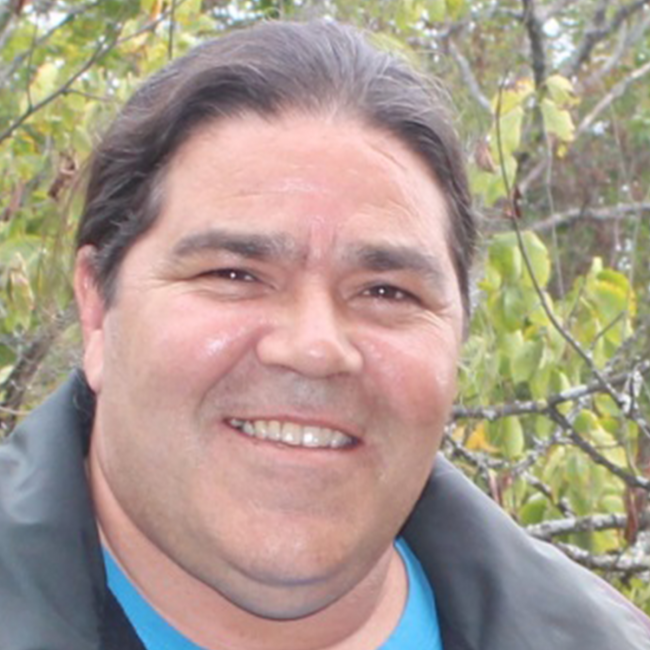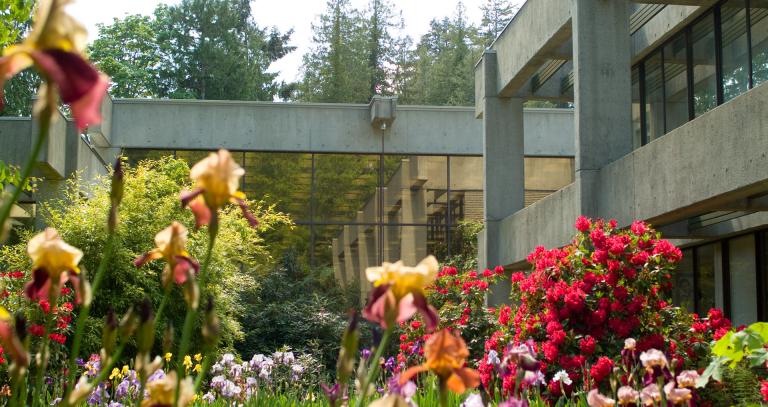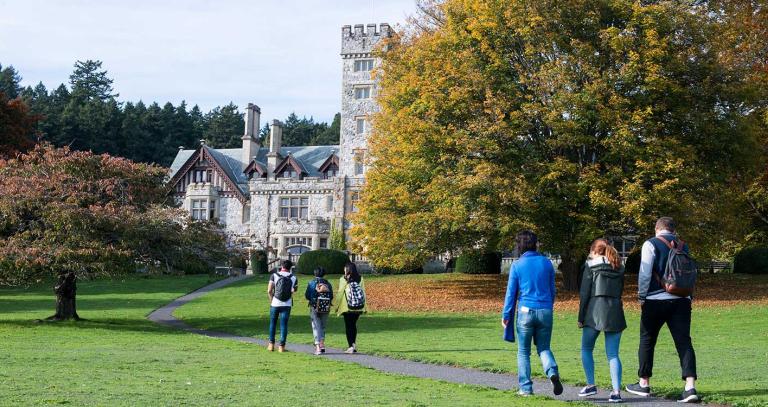Program description
Challenges that communities, organizations and societies face today are complex and demand interdisciplinary solutions.
The Doctor of Social Sciences responds to this need. It's a hybrid doctoral program that combines the rigour of research of a traditional PhD with applied, professional relevancy. You'll study across disciplines and focus on research with impact.
Through the program, you'll advance your applied research and leadership skills to tackle challenging issues and transform organizations.
This program is accessible if you're a mid-career professional. You'll study through a combination of online courses and two short residencies on campus with a group of other working professionals.
In addition to your coursework, you'll complete candidacy exams and a traditional or portfolio dissertation.
This program is ideal, if you're a policy analyst, senior administrator or executive from the public, private or non-profit sector.
Students and graduates include mid- to senior-level leaders from areas, such as natural resource management, health care, global security, professional communication, disaster relief, humanitarian aid, conflict management, values-based leadership, environmental sustainability, and learning and technology.
Research themes
Throughout your coursework, dissertation and research, you'll benefit from the academic and professional expertise of our faculty.
It's important for your program of study and research to connect with our academic program areas and align with Royal Roads University's strategic research themes, which include the following:
- innovative learning
- thriving organizations
- sustainable communities, livelihoods and the environment
Program outcomes
Once you have completed this program, you'll have developed skills in the following areas:
- applied research
- interdisciplinary and transdisciplinary analysis
- critical thinking
- scholar-practitioner orientation
- systems thinking
You'll be prepared for careers in the following areas:
- education
- health
- government and policy
- leadership
- any social science organization or community
Program delivery
The Doctor of Social Sciences (DSocSci) program is offered through a blend of online learning and two three-week residencies on campus.
The program usually takes four years, although completion times vary.
Schedule
The Doctor of Social Sciences program consists of these two parts:
- Online courses and residencies — For the first half of the program, you'll be immersed in coursework with a group of students.
- Candidacy exams and dissertation — During the second half of the program, you'll complete your candidacy exams and dissertation.
Online courses
You'll complete six online courses, including the Directed Study. Online courses consist of assigned readings, synchronous or asynchronous lectures, interactive discussions, and individual and team assignments.
You’re expected to meet deadlines and contribute meaningfully to your class. Your contributions are a big part of everyone’s learning.
You'll need to complete all of the courses in this program, before taking your candidacy exams.
Residency
This blended program has a two three-week residencies. Blended programs include online courses and on-campus residencies.
Residencies are intensive and immersive. Many students say this time together is the highlight of their program.
During your residency, you can expect to:
- attend classes full time (e.g., Monday to Friday from 8 a.m. to 5 p.m.)
- complete homework and individual and team assignments outside of class hours
- take part in extracurricular activities
Directed Study
The Directed Study is essential to help you prepare for your candidacy exams. You'll design the Directed Study with your selected instructor or supervisor to explore current knowledge and practice in your area of study and research. You'll study topic areas, such as substantive research issues and methods development. This course is assessed as pass or fail.
Candidacy exams
Prior to starting your dissertation, you'll need to complete your candidacy exams.
Your exams need to reflect your advanced and complex understanding and analysis of theoretical, methodological and substantive issues related to your dissertation.
The examination process is as follows:
- Written exam — You'll first provide a written submission to your supervisory committee.
- Oral exam — Your supervisory committee, chaired by the program head, will conduct your oral examination based on your written submission.
- Research proposal — After completion of your written and oral candidacy exams, you'll move to formal candidacy status. At this point, you'll submit your research proposal to the supervisory committee for approval.
- Ethics clearance — After your proposal is approved, you'll request ethics clearance from the university. Once you receive this, you can begin work on your dissertation.
Dissertation
Your dissertation is your final project of the doctoral program. You'll be required to commit about 1,400 hours of effort for the dissertation to be awarded with 42 credits.
Results of your research must make a distinct interdisciplinary contribution to applied scholarship in the social sciences. In addition, your dissertation should demonstrate a high degree of originality, understanding and knowledge about your topic area.
You can demonstrate originality through a combination of the following:
- development of a new critical analysis of a practical issue or challenge
- development of a new theory from practice
- novel application of existing theory to a practical challenge
- discovery of a new professional approach to practice
You should write your dissertation to a standard expected for professional and academic communication. It should be evident that your dissertation can be the basis for a published book, monograph or series of articles, and a significant application in the field.
Publication
Unless the Vice-President Academic & Provost has granted an exemption, you'll need to submit your dissertation for publication in Royal Roads University's Digital Archive, ProQuest, and Library and Archives Canada to graduate.
If you complete your dissertation in a non-traditional format, you need to submit a written (minimum 2500-word) summary with it. This the only part that is archived.
Completion options
You can choose from the following two options to complete your dissertation:
- Traditional monograph dissertation — This involves completing a 150- to 350-page (excluding bibliography) manuscript based on your research. With this option, your program ends with your defence of your dissertation. After you graduate, you may then use the research from the manuscript to develop journal articles, courses, policy papers, course curriculum or other materials.
- Dissertation by portfolio — Through this option, you'll complete your research and have it approved by the supervisory committee. After this, you can develop three different products or materials while you're still in the program, rather than focusing your efforts on writing a traditional monograph.
Dissertation process
The dissertation process includes the following steps:
- During your first year in the Doctor of Social Sciences, you’ll work with the program head to identify potential supervisors, who can best support your research. Unlike many conventional doctoral programs, your principal supervisor or advisors can be external to the university.
- You can begin work on your dissertation once you have successfully completed the written and oral candidacy exams. At that point you're considered a doctoral candidate.
- Your dissertation requires public defence and review by an external academic examiner. The external examiner should have an arms-length relationship with you and members of your supervisory committee.
Courses
Faculty
Transfer agreements
Refine results
Standard admission
- Normally, a master’s degree in one of the social sciences, or related field;
- Evidence of experience related to the degree program;
- Normally a minimum of 10 years with senior-level decision-making authority;
- A competitive, interdisciplinary, applied research proposal that reflects current research foci in the Faculty of Social and Applied Sciences at Royal Roads University.
Flexible admission
No flexible admission process for this program. All applicants must have a recognized master's degree.
English language proficiency
If English is not your primary language, please review our English language requirements.
Application process
- Application documents to the DSocSci program are to be submitted to the RRU Admissions Office where files will be prepared for review by the DSocSci Adjudication Committee.
- Admission selection will reflect a number of factors, including the applicant's academic skills and ability, the alignment of the proposed dissertation topic with the applied and academic goals of the degree, available faculty expertise to supervise the proposed dissertation, and the desire to balance topic areas within the cohort across areas of research expertise within the Faculty of Social and Applied Sciences.
- A telephone interview may be required.
All applications to this program require submission of the following information and supporting documents before your file can be assessed for admission:
Application form
In order to apply online, you will be required to create a log-in account using your email address. You will be required to list all credit courses and/or programs you have completed or are currently enrolled in. An application fee will be required. If your application fees are being paid by a third party, review sponsored student information. Once submitted, you may check the status of your application at any time.
Missed your application deadline? While we can’t make any guarantees, we may be able to accommodate late applications if there's still space and enough time to process. If you're interested in an intake that is now closed to applications, apply for the next available intake and email Admissions with your preferred start date. Make sure you’re prepared to submit your program's required documents right away. We can't make an admissions decision without them.
Official transcripts
Applicants are responsible for arranging for the submission of official transcripts from ALL post-secondary (higher education) institutions currently or previously attended, for all credit courses and/or programs. Transcripts are not required for non-credit programs or courses, though some programs may require proof of professional certifications or designations.
Transcripts are considered official only if submitted directly by the Registrar or other recognized authority of the providing institution in the institution's original, sealed envelope. If the envelope has been opened, the transcripts are no longer official and new (official) transcripts will be required to complete your application.
All international transcripts or credentials are subject to an international transcript and/or credential evaluation.
Three written letters of reference
The three letters of reference should consist of two letters from individuals qualified to speak specifically to the applicant's academic qualifications and ability to conduct research at the doctoral level and one letter from a professional in the applicant's career field qualified to assess the applicant's professional expertise.
Preliminary applied research proposal
The applicant’s three to five-page preliminary applied research proposal for the dissertation should include:
- Statement of the applied research topic including: what is the problem or issue, why it is important, what does the existing literature indicate, and the topic's relevance to the workplace, community, or society
- The rationale of the need for doctoral level study of the proposed problem or topic;
- A description of the social science fields of inquiry that contextualize the dissertation topic; and
- Statement of career goals and how the program links to those goals as well as the impact the program may have.
Structured résumé
The applicant’s structured résumé , which includes:
- Education (all post-secondary education, degrees, diplomas, and certificates)
- Professional experience (demonstration of progressively senior-level appointments with increasing levels of decision-making authority)
- Voluntary/unpaid work experience (including organization title, length of service, and a brief description of duties)
Writing sample
Thesis chapter, academic or professional report/publication.
Additional admission information
Doctoral-level courses from other institutions may be transferable. All transfer credit must be approved by the Dean and Registrar consistent with Royal Roads University policy. Such credit must demonstrate a high level of competency. No more than six credit hours (two courses) may be granted in total, and the courses must be assessed as direct equivalents of the courses contained in the DSocSci program of study. Royal Roads University is a member of the Western Canadian Deans of Graduate Studies and participates in the Western Canadian Deans of Graduate Studies Agreement.
If applicable:
- Applicants declaring permanent resident or Convention Refugee status in Canada, must submit a copy of their Permanent Resident Card (PR card) along with their application.
- Transcript evaluation fee or credential evaluation report, if submitting international transcripts.
- An official English language proficiency score report or other evidence of proficiency if English is not your primary language.
- Other information or documents as may be requested to determine your eligibility.
For information on how and where to send your supporting documents, refer to the document submission guidelines.



